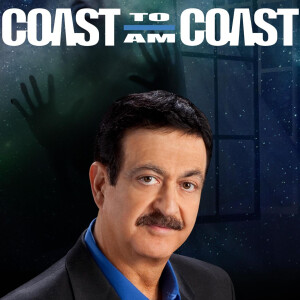
For several years, UFO researcher Ryan S. Wood stepped away from UFO research to focus on his work in the aerospace industry. But, as he told host George Knapp, in the first half of the show, recent revelations from whistleblower Major David Grusch inspired him to return to the work he had previously done and update his book on the MJ-12 (Majestic 12 or MAJIC) documents and other alleged UFO crashes. Wood told George that he felt "for 15 years or more, I've been beating my head against the wall, saying there's a bunch of UFO crashes, but now that we have a highly credible whistle-blower testifying before Congress, it invigorated me and made me work harder to republish my book and provide that to the public." He told George while "impossible is probably too strong a word, it's very difficult" for most researchers to penetrate the barriers of government secrecy surrounding UFO incidents.
Wood and Knapp discussed reasons for maintaining that secrecy, such as attempts to decipher the technology while keeping it out of the hands of rival nations. But Wood added, "I also think there's sort of a wild card element, in that the technology may be so advanced that it's really a call for more education in physics and chemistry, and material science," echoing conjecture from investigator's such as Jacques Vallee that alien visitation is intended to be witnessed, and to push humanity through a learning curve to a new level of advancement. Wood and Knapp also discussed the potential validity of the MJ-12 documents, and whether one of the reasons for leaking them was as part of a misinformation campaign, and whether the late Henry Kissinger might be one of the members of the MAJIC group.
------------------------------------------
One man is largely responsible for the twin pillars of current UFO belief: that UFOs represent extraterrestrial technology, and that the government is hiding this truth from us. His name is Donald E. Keyhoe and he was a 51-year-old retired Marine Major when his own investigation of a famous 1948 flying saucer case led him to believe that the US Air Force and the CIA knew the Earth was under surveillance by beings from other worlds and were keeping it secret from the public. English author Linda Powell has chronicled Keyhoe's life in a new book and joined George in the second half to discuss how, for the next 21 years of his life, Keyhoe devoted himself, at great personal cost, to exposing the official cover-up of what he believed was an alien visitation. Powell explained Keyhoe's early interest in writing and how, despite the fact that much had been written about (and by) Major Keyhoe himself, no one had yet undertaken a biography of the man. "I decided to write the biography because I realized no one had written one before, and I wanted to know more about him," she said.
Powell was eventually able to acquire a number of Keyhoe's personal correspondences from various sources, which she used in developing her work. These included documents related to his work with NICAP (National Investigation Committee on Aerial Phenomena) and other UFO groups. But mostly, Powell said, Keyhoe was important for paving the path that later whistleblowers and researchers would follow. "I suppose we could say (he's) the father of ufology, of serious research, and to some extent set the template for where we are today," she said. His work helped take UFOs from the realm of "small clubs sitting around and discussing UFOs" and onto the national scene, she explained. "He got military men involved... (and) all that brought him to the point where he became the authority and was the first to stand up and point the finger at the Air Force and say, 'What do you know that you are not telling us?' and that's pretty much where we still are today, I suppose."
KNAPP'S NEWS
More Episodes
 2024-01-17
2024-01-17
 2024-01-17
2024-01-17
 2024-01-17
2024-01-17
 2024-01-17
2024-01-17
 2024-01-17
2024-01-17
 2024-01-13
2024-01-13
 2024-01-13
2024-01-13
 2024-01-13
2024-01-13
 2024-01-13
2024-01-13
 2024-01-13
2024-01-13
 2024-01-13
2024-01-13
 2024-01-13
2024-01-13
 2024-01-13
2024-01-13
 2024-01-13
2024-01-13
 2024-01-13
2024-01-13
Create your
podcast in
minutes
- Full-featured podcast site
- Unlimited storage and bandwidth
- Comprehensive podcast stats
- Distribute to Apple Podcasts, Spotify, and more
- Make money with your podcast
It is Free
- Privacy Policy
- Cookie Policy
- Terms of Use
- Consent Preferences
- Copyright © 2015-2024 Podbean.com





